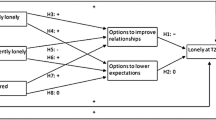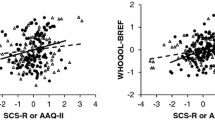Background: Morbid obesity can be accompanied by physical and social problems that may influence interpersonal relationships and the recruitment of social support. The problems can be tackled with a variety of coping strategies. Methods: 104 patients with a body mass index (BMI) 32-64 kg/m2 and mean age 36 yr were presented with the Utrecht Coping List (UCL) and the Loneliness Scale. Of these patients, 94 were female, and this cohort was analyzed more extensively. Results: Patients exhibited elevated values on the Loneliness Scale and in the UCL sub-scales palliative response, avoidance / wait-and-see, passive / depressive response pattern and expression of emotions / anger. The active approach UCL sub-scale scored lower than in a control group. Conclusion: Obese female patients displayed avoidance, wait-and-see and passive response pattern as coping behavior, experiencing their intimate relationships as relatively unreliable and not very intimate. More research is needed to determine the effect of coping behavior on therapeutic effect.
Similar content being viewed by others
Author information
Authors and Affiliations
Rights and permissions
About this article
Cite this article
Hörchner, R., Tuinebreijer, W.E., Kelder, H. et al. Coping Behavior and Loneliness Among Obese Patients. OBES SURG 12, 864–868 (2002). https://doi.org/10.1381/096089202320995718
Published:
Issue Date:
DOI: https://doi.org/10.1381/096089202320995718




